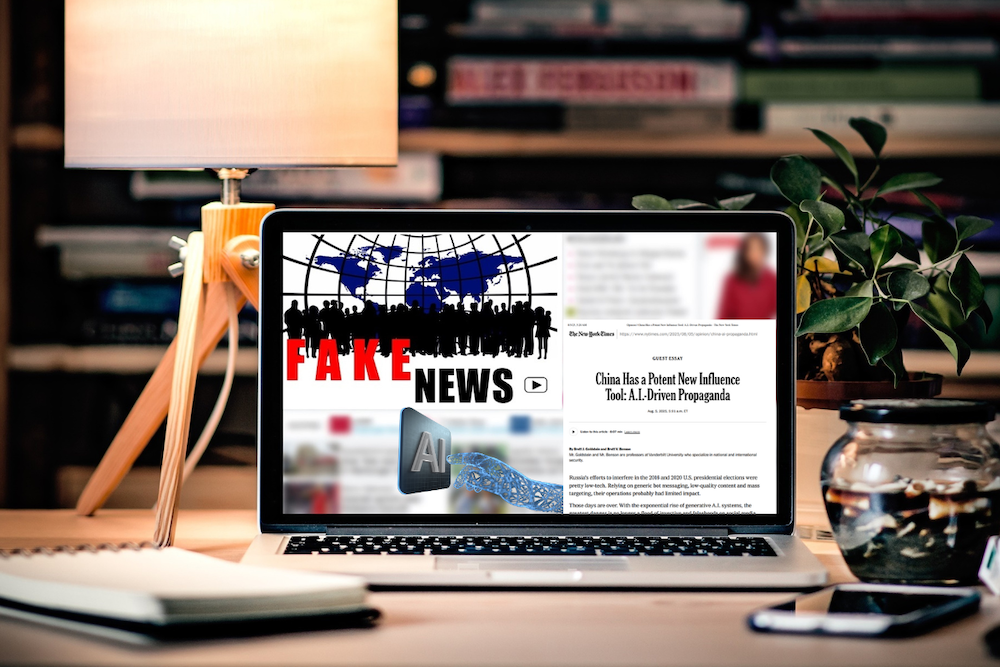Listen to the article
Vanderbilt Researchers Uncover Sophisticated AI-Driven Propaganda Operations
Academic researchers have issued an urgent call to action regarding the convergence of artificial intelligence, open-source intelligence, and influence campaigns that serve hostile state objectives. This warning comes from Vanderbilt University researchers Brett V. Benson and Brett J. Goldstein, who recently detailed their findings in a guest essay published in The New York Times.
Their piece, titled “The Era of A.I. Propaganda Has Arrived, and America Must Act,” is based on nearly 400 pages of documents uncovered by the Vanderbilt Institute of National Security. The research represents a significant faculty-led effort to address major international security concerns in the digital age.
“Supporting research at the intersection of national security and AI expands our understanding of the evolving threats facing democratic systems and global security,” said Liz Zechmeister, Vanderbilt’s interim chief research officer and senior associate provost for research and development. “We’re committed to bold, high-impact research that meets challenges head-on.”
The documents, which the university is releasing in stages, contain evidence that GoLaxy, a company with ties to the Chinese government, has deployed sophisticated AI-driven propaganda campaigns in Hong Kong and Taiwan aimed at shaping public opinion and suppressing dissent. This discovery fundamentally changes how experts understand propaganda and its potential impact.
“Before, we knew propaganda could be effective and that foreign governments were pushing it. However, its reach was thought to be constrained by costs, scale and the human labor needed to sustain it,” explained Benson, an associate professor of political science. “The GoLaxy discovery showed those limits no longer apply.”
The researchers found that AI-powered propaganda systems can operate at unprecedented scale while simultaneously delivering highly personalized messaging. “It’s not just about the total number of people. It’s about the ability to tailor messaging down to the individual. That hasn’t been done before,” said Goldstein, a research professor of engineering science and management.
Perhaps most concerning for U.S. national security, the researchers discovered that GoLaxy has built extensive data profiles on thousands of American political figures, including congressional leaders. “Identifying and understanding the implications is something that’s going to potentially change the world and how we think about national security strategy,” Goldstein warned.
The interdisciplinary nature of the research proved crucial to decoding the documents. Benson, a political economist, and Goldstein, a computer scientist, brought complementary expertise to the project. “It’s a great example of what Chancellor Diermeier calls ‘radical collaboration,’ done right,” Goldstein noted. “Vanderbilt is breaking down silos to tackle critical issues as true partners.”
The Institute of National Security at Vanderbilt played a pivotal role by connecting experts across disciplines. “The Institute brought together experts from different backgrounds whose professional paths might never have crossed, and whose complementary strengths have made this and future research possible,” Benson said.
The findings highlight how AI tools can be weaponized to strategically, persuasively, and covertly shape public opinion on a massive scale. Addressing these threats will require urgent collaboration across academia, government, and the private sector, according to the researchers.
The GoLaxy case demonstrates the value of research environments like Vanderbilt, where interdisciplinary collaboration, strong partnerships, and mission-driven inquiry make it possible to confront rapidly evolving security threats.
“Universities are well positioned to lead this work while remaining independent from commercial and political agendas,” Benson emphasized. This “neutrality builds the trust needed to inform government, industry, and the public” about emerging threats.
As AI-driven propaganda capabilities continue to advance, the researchers suggest that collaboration and trust within academic institutions may represent democracy’s best defense against these sophisticated influence operations.
Fact Checker
Verify the accuracy of this article using The Disinformation Commission analysis and real-time sources.




8 Comments
It’s encouraging to see academia taking a leading role in sounding the alarm on AI propaganda. Interdisciplinary collaboration between experts in technology, security, and policy will be crucial to developing effective countermeasures.
The Vanderbilt researchers make a compelling case for the urgent need to address the threat of AI propaganda. As these technologies become more sophisticated, the potential for abuse and manipulation only grows.
The Vanderbilt researchers raise important points about the national security implications of AI-powered propaganda. As artificial intelligence becomes more advanced, the potential for malicious actors to weaponize it is alarming.
This is a complex challenge that will require continuous monitoring and rapid adaptation as the threat landscape evolves. Proactive steps are needed to get ahead of these emerging risks.
This is a timely and important warning about the dangers of AI-enabled influence campaigns. Safeguarding democratic discourse in the digital age requires a clear-eyed assessment of the challenges and a robust regulatory response.
I’m curious to learn more about the specific techniques and tactics being employed by malicious actors in these AI propaganda operations. Understanding the mechanics will be key to designing effective countermeasures.
This is a concerning report on the growing threat of AI-powered propaganda campaigns. It’s crucial that governments and tech companies work together to develop effective regulatory responses to counter these emerging challenges to democratic discourse.
I agree, the spread of AI-driven misinformation is a serious issue that requires a coordinated, multi-stakeholder approach to address. Robust safeguards and transparency measures will be essential.